Unit 12 What did you do last weekend? 单元复习课件 (共53张PPT)
文档属性
| 名称 | Unit 12 What did you do last weekend? 单元复习课件 (共53张PPT) |  | |
| 格式 | pptx | ||
| 文件大小 | 3.1MB | ||
| 资源类型 | 试卷 | ||
| 版本资源 | 人教新目标(Go for it)版 | ||
| 科目 | 英语 | ||
| 更新时间 | 2021-05-08 15:42:12 | ||
图片预览

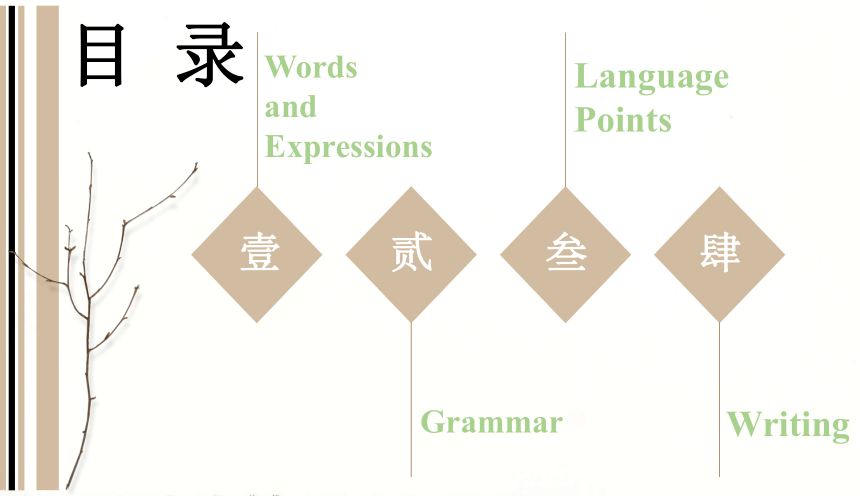
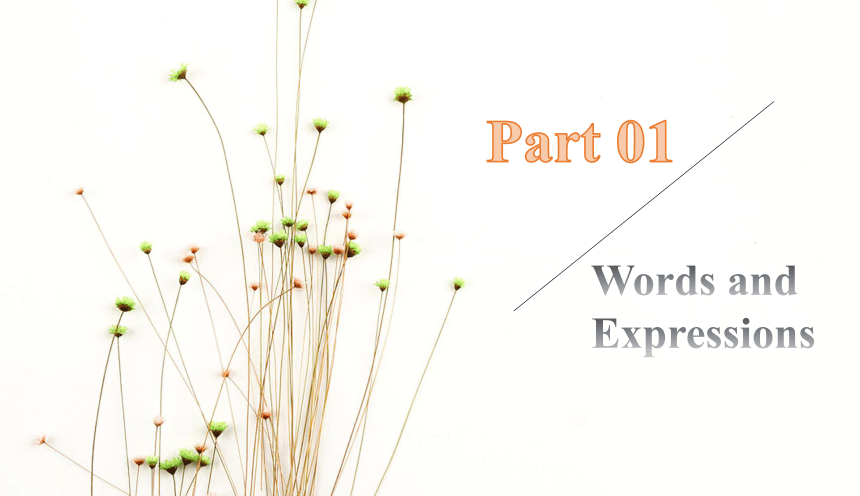
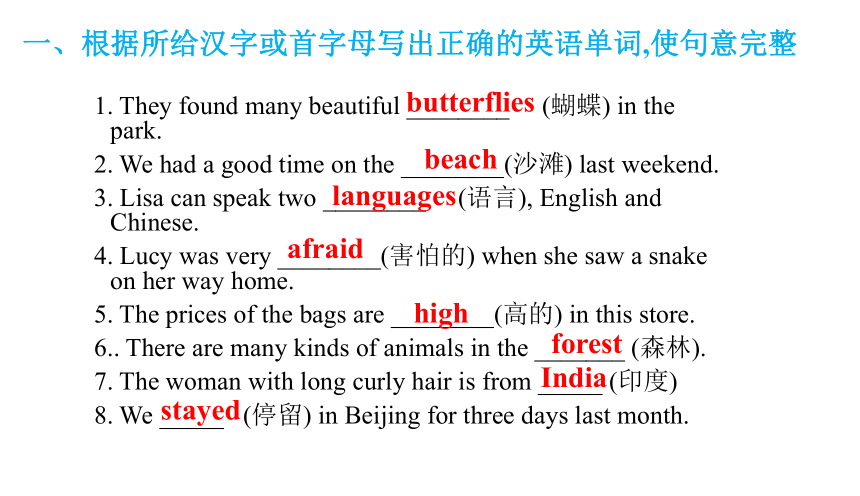
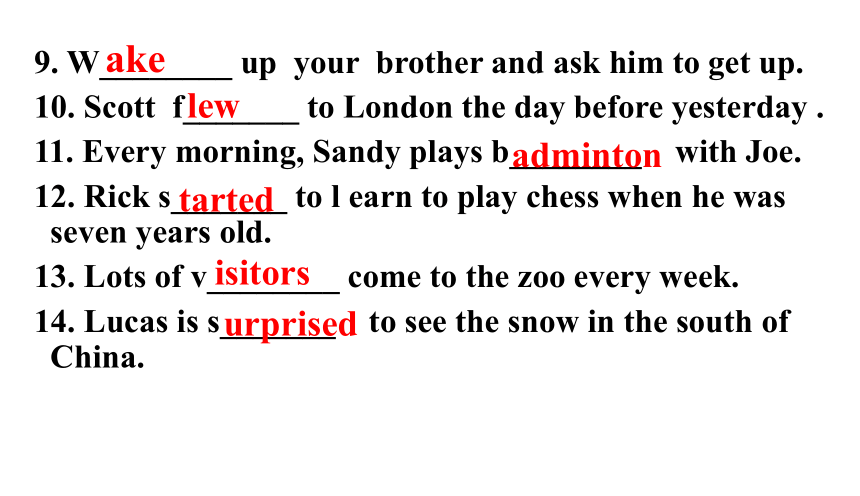

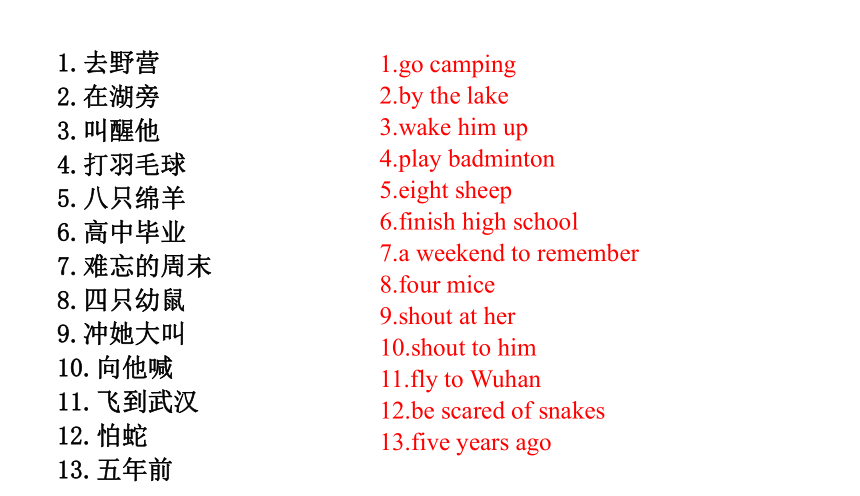
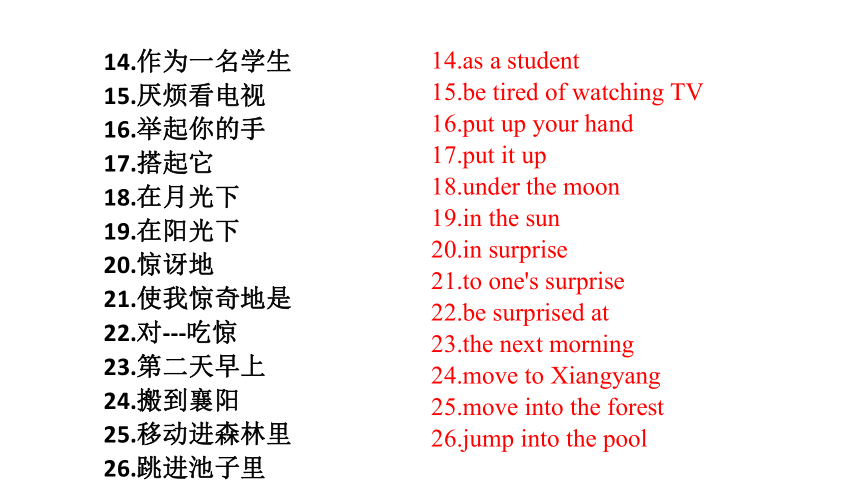
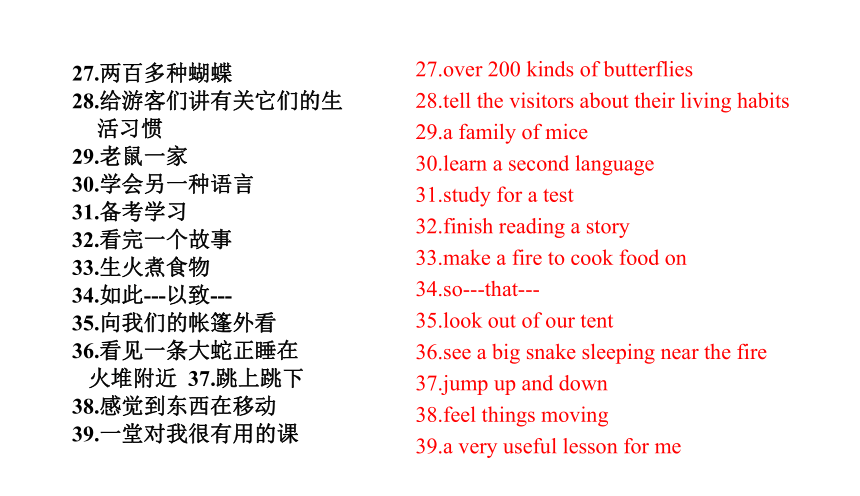
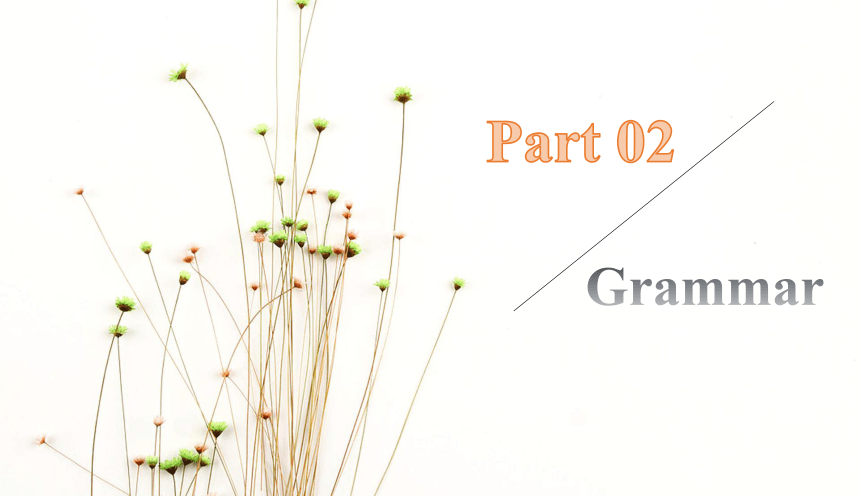
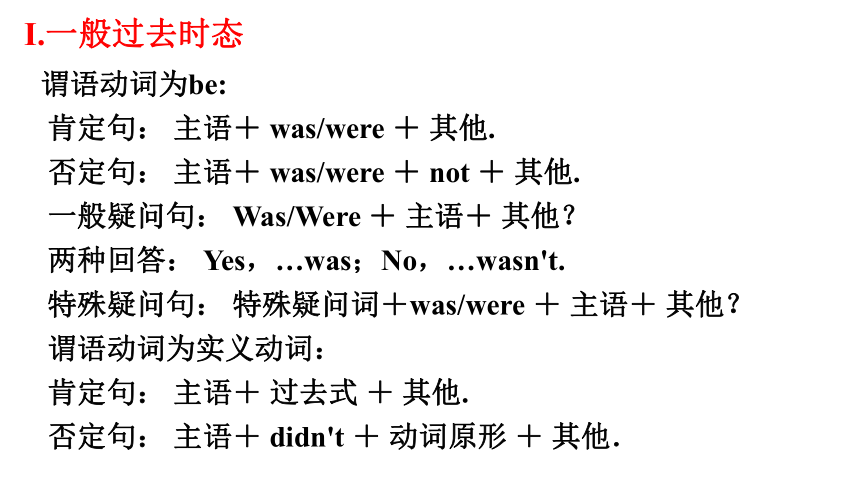

文档简介
(共52张PPT)
人教版七年级下册复习课件
Unit 12 What did you do last weekend
壹
贰
叁
肆
目 录
Words
and Expressions
Grammar
Language
Points
Writing
Part 01
Words and Expressions
1. They found many beautiful ________ (蝴蝶) in the park.
2. We had a good time on the ________(沙滩) last weekend.
3. Lisa can speak two ________ (语言), English and Chinese.
4. Lucy was very ________(害怕的) when she saw a snake on her way home.
5. The prices of the bags are ________(高的) in this store.
6.. There are many kinds of animals in the _______ (森林).
7. The woman with long curly hair is from _____ (印度)
8. We _____ (停留) in Beijing for three days last month.
butterflies
beach
languages
afraid
high
forest
India
stayed
一、根据所给汉字或首字母写出正确的英语单词,使句意完整
9. W________ up your brother and ask him to get up.
10. Scott f_______ to London the day before yesterday .
11. Every morning, Sandy plays b________ with Joe.
12. Rick s_______ to l earn to play chess when he was seven years old.
13. Lots of v________ come to the zoo every week.
14. Lucas is s_______ to see the snow in the south of China.
ake
lew
adminton
tarted
isitors
urprised
15. We first met each other three years a________.
16. The desk is so heavy that I can’t m_______ it.
17. Mom w________ me up at 6:30 this morning.
18. My brother Is interested in n________ science.
19.After a day’s work, my mother feels very t________.
20.We know that m________ are afraid of cats.
atural
ice
ired
go
ove
oke
1.go camping
2.by the lake
3.wake him up
4.play badminton
5.eight sheep
6.finish high school
7.a weekend to remember
8.four mice
9.shout at her
10.shout to him
11.fly to Wuhan
12.be scared of snakes
13.five years ago
1.去野营
2.在湖旁
3.叫醒他
4.打羽毛球
5.八只绵羊
6.高中毕业
7.难忘的周末
8.四只幼鼠
9.冲她大叫
10.向他喊
11.飞到武汉
12.怕蛇
13.五年前
14.as a student
15.be tired of watching TV
16.put up your hand
17.put it up
18.under the moon
19.in the sun
20.in surprise
21.to one's surprise
22.be surprised at
23.the next morning
24.move to Xiangyang
25.move into the forest
26.jump into the pool
14.作为一名学生
15.厌烦看电视
16.举起你的手
17.搭起它
18.在月光下
19.在阳光下
20.惊讶地
21.使我惊奇地是
22.对---吃惊
23.第二天早上
24.搬到襄阳
25.移动进森林里
26.跳进池子里
27.over 200 kinds of butterflies
28.tell the visitors about their living habits
29.a family of mice
30.learn a second language
31.study for a test
32.finish reading a story
33.make a fire to cook food on
34.so---that---
35.look out of our tent
36.see a big snake sleeping near the fire
37.jump up and down
38.feel things moving
39.a very useful lesson for me
27.两百多种蝴蝶
28.给游客们讲有关它们的生活习惯
29.老鼠一家
30.学会另一种语言
31.备考学习
32.看完一个故事
33.生火煮食物
34.如此---以致---
35.向我们的帐篷外看
36.看见一条大蛇正睡在
火堆附近 37.跳上跳下
38.感觉到东西在移动
39.一堂对我很有用的课
Part 02
Grammar
谓语动词为be:
肯定句: 主语+ was/were + 其他.
否定句: 主语+ was/were + not + 其他.
一般疑问句: Was/Were + 主语+ 其他?
两种回答: Yes,…was;No,…wasn't.
特殊疑问句: 特殊疑问词+was/were + 主语+ 其他?
谓语动词为实义动词:
肯定句: 主语+ 过去式 + 其他.
否定句: 主语+ didn't + 动词原形 + 其他.
I.一般过去时态
一般疑问句: Did + 主语+动词原形 + 其他?
两种回答: Yes, … did; No,… didn't.
特殊疑问句: 特殊疑问词 + did + 主语+动词原形 + 其他? 如:
My weekend was pretty good.
→My weekend wasn't pretty good.
→Was your weekend pretty good
→Yes, it was; No, it wasn't.
→How was your weekend
She went to Beijing last week.
→She didn't go to Beijing last week.
→Did she go to Beijing last week
→Yes, she did; No, she didn't.
→Who went to Beijing last week
→Where did she go last week
→When did she go to Beijing
What did you do last weekend I did my homework./ We went boating.
Who visited her grandma Becky did.
Where did she go last weekend She went to a farm.
Who did she go with She went with her classmates.
Grammar Focus
Ⅱ.感叹句
感叹句通常由what, how引导,表示赞美、惊叹、喜悦等感情。what修饰名词,how 修饰形容词、副词或动词。
感叹句结构:
1.What +名词+ 陈述语序.
What + a+形容词+名词+ 陈述语序.
What + 形容词+复数名词+ 陈述语序.
What + 形容词+不可数名词+ 陈述语序.
如:
What noise they are making!
What a clever boy he is!
What wonderful ideas (we have)!
What cold weather it is!
2. How+形容词或副词+ 陈述语序.
如:
How lovely the baby is!
How hard Wu Yingjia works!
Part 03
Language Points
1. sheep 名词,意为“绵羊”。它是单复数同形的单词,当它作主语时谓语动词的单复数形式要根据它在句中的意思来确定。类似的单词还有deer (鹿), Chinese (中国人)等。
例如:
Look, there are three sheep eating grass under the tree.
看! 树下有三只羊在吃草。
2. I worked as a guide at the Natural History Museum.
我在自然历史博物馆里做导游的工作。
句中的as是介词,意为“作为;当作”。
如:
My sister works as a nurse in a hospital.
我妹妹在一家医院当护士。
3. They have a butterfly house with over 200 kinds of butterflies!
句中的with是介词,意为“有;带有”。
Who is the girl with long blonde hair
那位金色长发的女孩是谁?
句中的kind是名词,意为“种;类”,是可数名词。
如:
There are three kinds of fruits on the table.
桌子上有三种水果。
【链接】与kind有关的短语有:
a kind of “一种;某种(不明确的东西)”,
kind of “有点”,
many / different / all kinds of “各种各样的”。
4. I stayed up late to watch the soccer game.
stay up 意为“熬夜;深夜不眠” 。
例如:
Don’t stay up late. It’s bad for your health.
不要熬夜,这对你的健康不好。
Let’s stay up to see the New Year.
咱们别睡觉,迎接新年的到来吧。
5. mouse 意为“老鼠”,复数形式为“mice”。
如:
他们看到了两只老鼠。
They saw two mice.
6. language 意为“语言”,是可数名词。
如:
英语、汉语、法语是三种不同的语言。
English, Chinese and French are three different languages.
7. shout at “冲......大声叫嚷”,后面要跟人或事物。
不要朝孩子们大声喊叫。
Don’t shout at the children.
8. My sister finished high school two weeks ago.
two weeks ago “两星期前”,一段时间 + ago意为“多长时间之前”,是表达过去的时间。它常与一般过去时态连用。
如:
三天前,我们参观了自然历史博物馆。
We visited the Natural History Museum three days ago.
【辨析】before 意为“在……之前”,
其后可以跟一个时间的点;表示“在某 个时间点之前”,但不一定用于一般过去时态。
如:
我常在七点钟前去上学。
I usually go to school before seven.
此外,before也可以单独用,意为“以前”,可用于一般过去时态中。如:
以前我不知道那件事情。
I didn’t know that before.
9. There we put up our tents and ...
put up 意为“搭起;举起”,
如:
让我们将帐篷搭起来吧。
Let’s put up the tent.
如果你有什么问题,请举起手来。
If you have any questions, please put up your hands.
10. I was so tired that I went to sleep early.
句中so ... that ... 的意思是“如此……
以至于……”。
如:
He is so young that he can’t look after himself.
他如此小以至于不能照顾自己。
11. My dad started to jump up and down in their tent.
start 作动词,可意为“开始;着手”。常用结构为start to do sth.和start doing sth. (开始做某事)。
如:
I started to do / doing my homework at 5:30.
我五点半开始做作业的。
12. This woke the snake up and it moved into the forest near the lake.
wake up 唤醒; 后面可以跟名词或代词; 跟名词时可以放在wake up的后面或中间; 但是如果是跟代词的话应放于 wake up 的中间。如:
早上你常什么时候醒来?
When do you usually wake up
不要如此大声说话,你会将他们吵醒。
Don’t speak so loud. You’ll wake them up.
13. The next morning, my sister and I got a terrible surprise.
第二天早晨,我和姐姐大吃一惊。
surprise作名词,意为“惊奇,惊讶”。作动词,意为“使吃惊” ,后面可接表示人的词作宾语,意为“使某人惊奇”。
例如:
I’d like to give him a surprise.
Bob’s answer surprised us.
The boy looked at me in surprise.
To my surprise, he came here so early.
常用搭配:
get a surprise 吃惊
in surprise“惊奇地”,修饰谓语动词。
to one’s surprise 意为“使某人惊讶的是”,一般放在句首。
14. We saw a big snake sleeping near the fire.
我们看见一条大蛇正在篝火附近睡觉。
see sb doing sth意为“看到某人正在做某事”。除了see,表示感官的动词hear, feel, watch等都有这种用法。如:
I can hear the children singing in the classroom.
我能听见孩子们在教室里唱歌。
一、用括号中所给单词的适当形式填空
1.My English teacher tells me it's important ___________ (learn) a second language.
2.It is very tiring to look after two _______ (baby).
3.Two _______ (mouse) are fighting in the kitchen.
4.There were so many _______ (visit) in the museum yesterday.
5.How about going (boat)
to learn
babies
mice
visitors
boating
6.The math test of last term ______ (be)a little difficult.
7.He put on his coat and_________(go)out.
8.My grandmother________(tell)us an interesting story last night.
9.He _______(live)in Nanjing in 2008.
10.Linda____________(not speak)Chinese last year.
was
went
told
lived
didn’t speak
二、按要求变化下列各句:
1. He wanted to do something.(变为一般疑问句)
_________ he __________to do _________
2. I cleaned my room last weekend.(就画线部分提问)
___________ ________ you ___________ last weekend
3. It was time for lunch.(变为同义句)
It was time _________ ________ lunch.
4. I can’t do anything.(变为同义句)
I can _____________ _____________.
5. It took me two hours to do my homework.(变为同义句)
I _____________ two hours ______ my homework.
Did want anything
What did do
to have
do nothing
spent on/doing
三、根据汉语意思完成英语句子
1.我可以教你搭帐篷。
I can teach you to a tent.
2.看到那条蛇的时候。我们都很吃惊。
When we saw the snake, we all .
3.我妹妹喜欢在沙发上跳上跳下。
My sister likes to jump on the sofa.
4.你们必须互相帮助才能完成这项工作。
You have to help to finish the work.
5.十年前我奶奶在农村生火做饭。
My grandma to cook dinner in the countryside ten years ago.
put up
got a surprise
up and down
each other
made a fire
四、单项选择
(兰州中考)---______ fine weather it is!
Let's go for a walk.
---Sounds like a great idea.
A. What B. How C. What a D. How a
2. What ______ he _____ over the weekend
A. do, did B. did, did C. did, do
3. --How ____ your weekend
--Not too bad. I stayed home and watched TV.
A. was B. were C. is
A
C
A
4. I don’t have _____ bread, but I’d like ____.
A. any, few B. any, few C. any, a little
5. --Can’t you hear ______
--No, I can hear _______.
A. anything, nothing B. anything, something
C. something, something
6. -- How _____ your weekend
-- It ______ great. But I ______ tired now.
A. was, was, am B. is, was, was
C. is, is, am D. is, is, was
C
A
A
7. Last month I _____ a new song.
A. write B. writes C. wrote D. to write
8. -- Where _____ you _____ last Monday
-- I went to the library.
A. do; go B. did; go
C. does; go D. did; went
9. -- Did you eat _____ in the morning
-- No, I didn’t eat _____.
A. something; anything B. anything; anything
C. something; something D. anything; something
C
B
B
10. —What's it I feel something ________ in the
house
—Maybe it is a mouse. We should keep a cat.
A.move B.moving C.to move D.moves
11. —It's cool. Who ________ the tent for us Do
you know
—Let me see. It must be Tom.
A.puts up B.goes into
C.put up D.put in
B
C
12.—Where is your cousin
—He ________ an English exam now.
A.has B.had C.have D.is having
13.—Can I help you, boy
—Yes. There is ________ wrong with my bike.
A.something B.anything
C.everything D.nothing
14. —Would you like ________ hot here
—No, you'd better not, I don't like hot food.
A.have anything B.have something
C.to have something D.to have nothing
D
A
C
15. —I'm ________ nervous about the coming
interview.
—You can do it. Take it easy.
A. kind of B. kinds of
C. kind D. kinds
16.Look! He is working ________ the computer.
A.in front of B.in the front of
C.between D.behind
17.We are all ________ at the result of the match.
A.surprising B.surprised
C.surprise D.surprises
A
B
A
18.________is really wonderful ________ by the
lake.
A.That; to fish B.This; fish
C.It; to fish D.It; fishes
19.The exciting news made everyone ________.
A.cry B.crying C.cries D.to cry
20.(乐山中考)______ exciting the news is!
Beijing will hold 2022 Winter Olympic Games.
A. How B. What a C. What
A
C
A
Part 04
Writing
请你想想上个周末去了哪儿, 做了些什么, 周末感受如何 现在写下来向大家做个汇报吧! 词数不少于60个。
____________________________________
____________________________________
____________________________________
____________________________________
书面表达一
I had a really good time last weekend. Sunday was my sister’s birthday. In the morning, we had a small party. Mother cooked delicious food for her. And I made a nice card for her. She loved it very much. In the afternoon, our parents took us to Happy Garden. It is a good place for kids. There are lots of things to enjoy. On Sunday night, we went to a movie. It was very interesting.
【参考范文】
书面表达二
请你根据下面的汉语提示,以My Great Weekend为题用英语写一篇60词左右的短文。
提示:星期六是一个雨天,你上午在家看电视,下午与父母亲一同逛商场;周日上午,你和同学们打乒乓球,晚上你们参加了一个生日聚会。
My Great Weekend
____________________________________________________________________________________________________________________________________
My Great Weekend
How was your weekend I had a great weekend. It was rainy on Saturday. I stayed at home and watched TV in the morning.In the afternoon, I went shopping with my parents. They bought me some new clothes. On Sunday morning, I met my classmates and we played ping-pong. In the evening. I went to a birthday party with them. We had a good time at the party.
【参考范文】
THANKS
人教版七年级下册复习课件
Unit 12 What did you do last weekend
壹
贰
叁
肆
目 录
Words
and Expressions
Grammar
Language
Points
Writing
Part 01
Words and Expressions
1. They found many beautiful ________ (蝴蝶) in the park.
2. We had a good time on the ________(沙滩) last weekend.
3. Lisa can speak two ________ (语言), English and Chinese.
4. Lucy was very ________(害怕的) when she saw a snake on her way home.
5. The prices of the bags are ________(高的) in this store.
6.. There are many kinds of animals in the _______ (森林).
7. The woman with long curly hair is from _____ (印度)
8. We _____ (停留) in Beijing for three days last month.
butterflies
beach
languages
afraid
high
forest
India
stayed
一、根据所给汉字或首字母写出正确的英语单词,使句意完整
9. W________ up your brother and ask him to get up.
10. Scott f_______ to London the day before yesterday .
11. Every morning, Sandy plays b________ with Joe.
12. Rick s_______ to l earn to play chess when he was seven years old.
13. Lots of v________ come to the zoo every week.
14. Lucas is s_______ to see the snow in the south of China.
ake
lew
adminton
tarted
isitors
urprised
15. We first met each other three years a________.
16. The desk is so heavy that I can’t m_______ it.
17. Mom w________ me up at 6:30 this morning.
18. My brother Is interested in n________ science.
19.After a day’s work, my mother feels very t________.
20.We know that m________ are afraid of cats.
atural
ice
ired
go
ove
oke
1.go camping
2.by the lake
3.wake him up
4.play badminton
5.eight sheep
6.finish high school
7.a weekend to remember
8.four mice
9.shout at her
10.shout to him
11.fly to Wuhan
12.be scared of snakes
13.five years ago
1.去野营
2.在湖旁
3.叫醒他
4.打羽毛球
5.八只绵羊
6.高中毕业
7.难忘的周末
8.四只幼鼠
9.冲她大叫
10.向他喊
11.飞到武汉
12.怕蛇
13.五年前
14.as a student
15.be tired of watching TV
16.put up your hand
17.put it up
18.under the moon
19.in the sun
20.in surprise
21.to one's surprise
22.be surprised at
23.the next morning
24.move to Xiangyang
25.move into the forest
26.jump into the pool
14.作为一名学生
15.厌烦看电视
16.举起你的手
17.搭起它
18.在月光下
19.在阳光下
20.惊讶地
21.使我惊奇地是
22.对---吃惊
23.第二天早上
24.搬到襄阳
25.移动进森林里
26.跳进池子里
27.over 200 kinds of butterflies
28.tell the visitors about their living habits
29.a family of mice
30.learn a second language
31.study for a test
32.finish reading a story
33.make a fire to cook food on
34.so---that---
35.look out of our tent
36.see a big snake sleeping near the fire
37.jump up and down
38.feel things moving
39.a very useful lesson for me
27.两百多种蝴蝶
28.给游客们讲有关它们的生活习惯
29.老鼠一家
30.学会另一种语言
31.备考学习
32.看完一个故事
33.生火煮食物
34.如此---以致---
35.向我们的帐篷外看
36.看见一条大蛇正睡在
火堆附近 37.跳上跳下
38.感觉到东西在移动
39.一堂对我很有用的课
Part 02
Grammar
谓语动词为be:
肯定句: 主语+ was/were + 其他.
否定句: 主语+ was/were + not + 其他.
一般疑问句: Was/Were + 主语+ 其他?
两种回答: Yes,…was;No,…wasn't.
特殊疑问句: 特殊疑问词+was/were + 主语+ 其他?
谓语动词为实义动词:
肯定句: 主语+ 过去式 + 其他.
否定句: 主语+ didn't + 动词原形 + 其他.
I.一般过去时态
一般疑问句: Did + 主语+动词原形 + 其他?
两种回答: Yes, … did; No,… didn't.
特殊疑问句: 特殊疑问词 + did + 主语+动词原形 + 其他? 如:
My weekend was pretty good.
→My weekend wasn't pretty good.
→Was your weekend pretty good
→Yes, it was; No, it wasn't.
→How was your weekend
She went to Beijing last week.
→She didn't go to Beijing last week.
→Did she go to Beijing last week
→Yes, she did; No, she didn't.
→Who went to Beijing last week
→Where did she go last week
→When did she go to Beijing
What did you do last weekend I did my homework./ We went boating.
Who visited her grandma Becky did.
Where did she go last weekend She went to a farm.
Who did she go with She went with her classmates.
Grammar Focus
Ⅱ.感叹句
感叹句通常由what, how引导,表示赞美、惊叹、喜悦等感情。what修饰名词,how 修饰形容词、副词或动词。
感叹句结构:
1.What +名词+ 陈述语序.
What + a+形容词+名词+ 陈述语序.
What + 形容词+复数名词+ 陈述语序.
What + 形容词+不可数名词+ 陈述语序.
如:
What noise they are making!
What a clever boy he is!
What wonderful ideas (we have)!
What cold weather it is!
2. How+形容词或副词+ 陈述语序.
如:
How lovely the baby is!
How hard Wu Yingjia works!
Part 03
Language Points
1. sheep 名词,意为“绵羊”。它是单复数同形的单词,当它作主语时谓语动词的单复数形式要根据它在句中的意思来确定。类似的单词还有deer (鹿), Chinese (中国人)等。
例如:
Look, there are three sheep eating grass under the tree.
看! 树下有三只羊在吃草。
2. I worked as a guide at the Natural History Museum.
我在自然历史博物馆里做导游的工作。
句中的as是介词,意为“作为;当作”。
如:
My sister works as a nurse in a hospital.
我妹妹在一家医院当护士。
3. They have a butterfly house with over 200 kinds of butterflies!
句中的with是介词,意为“有;带有”。
Who is the girl with long blonde hair
那位金色长发的女孩是谁?
句中的kind是名词,意为“种;类”,是可数名词。
如:
There are three kinds of fruits on the table.
桌子上有三种水果。
【链接】与kind有关的短语有:
a kind of “一种;某种(不明确的东西)”,
kind of “有点”,
many / different / all kinds of “各种各样的”。
4. I stayed up late to watch the soccer game.
stay up 意为“熬夜;深夜不眠” 。
例如:
Don’t stay up late. It’s bad for your health.
不要熬夜,这对你的健康不好。
Let’s stay up to see the New Year.
咱们别睡觉,迎接新年的到来吧。
5. mouse 意为“老鼠”,复数形式为“mice”。
如:
他们看到了两只老鼠。
They saw two mice.
6. language 意为“语言”,是可数名词。
如:
英语、汉语、法语是三种不同的语言。
English, Chinese and French are three different languages.
7. shout at “冲......大声叫嚷”,后面要跟人或事物。
不要朝孩子们大声喊叫。
Don’t shout at the children.
8. My sister finished high school two weeks ago.
two weeks ago “两星期前”,一段时间 + ago意为“多长时间之前”,是表达过去的时间。它常与一般过去时态连用。
如:
三天前,我们参观了自然历史博物馆。
We visited the Natural History Museum three days ago.
【辨析】before 意为“在……之前”,
其后可以跟一个时间的点;表示“在某 个时间点之前”,但不一定用于一般过去时态。
如:
我常在七点钟前去上学。
I usually go to school before seven.
此外,before也可以单独用,意为“以前”,可用于一般过去时态中。如:
以前我不知道那件事情。
I didn’t know that before.
9. There we put up our tents and ...
put up 意为“搭起;举起”,
如:
让我们将帐篷搭起来吧。
Let’s put up the tent.
如果你有什么问题,请举起手来。
If you have any questions, please put up your hands.
10. I was so tired that I went to sleep early.
句中so ... that ... 的意思是“如此……
以至于……”。
如:
He is so young that he can’t look after himself.
他如此小以至于不能照顾自己。
11. My dad started to jump up and down in their tent.
start 作动词,可意为“开始;着手”。常用结构为start to do sth.和start doing sth. (开始做某事)。
如:
I started to do / doing my homework at 5:30.
我五点半开始做作业的。
12. This woke the snake up and it moved into the forest near the lake.
wake up 唤醒; 后面可以跟名词或代词; 跟名词时可以放在wake up的后面或中间; 但是如果是跟代词的话应放于 wake up 的中间。如:
早上你常什么时候醒来?
When do you usually wake up
不要如此大声说话,你会将他们吵醒。
Don’t speak so loud. You’ll wake them up.
13. The next morning, my sister and I got a terrible surprise.
第二天早晨,我和姐姐大吃一惊。
surprise作名词,意为“惊奇,惊讶”。作动词,意为“使吃惊” ,后面可接表示人的词作宾语,意为“使某人惊奇”。
例如:
I’d like to give him a surprise.
Bob’s answer surprised us.
The boy looked at me in surprise.
To my surprise, he came here so early.
常用搭配:
get a surprise 吃惊
in surprise“惊奇地”,修饰谓语动词。
to one’s surprise 意为“使某人惊讶的是”,一般放在句首。
14. We saw a big snake sleeping near the fire.
我们看见一条大蛇正在篝火附近睡觉。
see sb doing sth意为“看到某人正在做某事”。除了see,表示感官的动词hear, feel, watch等都有这种用法。如:
I can hear the children singing in the classroom.
我能听见孩子们在教室里唱歌。
一、用括号中所给单词的适当形式填空
1.My English teacher tells me it's important ___________ (learn) a second language.
2.It is very tiring to look after two _______ (baby).
3.Two _______ (mouse) are fighting in the kitchen.
4.There were so many _______ (visit) in the museum yesterday.
5.How about going (boat)
to learn
babies
mice
visitors
boating
6.The math test of last term ______ (be)a little difficult.
7.He put on his coat and_________(go)out.
8.My grandmother________(tell)us an interesting story last night.
9.He _______(live)in Nanjing in 2008.
10.Linda____________(not speak)Chinese last year.
was
went
told
lived
didn’t speak
二、按要求变化下列各句:
1. He wanted to do something.(变为一般疑问句)
_________ he __________to do _________
2. I cleaned my room last weekend.(就画线部分提问)
___________ ________ you ___________ last weekend
3. It was time for lunch.(变为同义句)
It was time _________ ________ lunch.
4. I can’t do anything.(变为同义句)
I can _____________ _____________.
5. It took me two hours to do my homework.(变为同义句)
I _____________ two hours ______ my homework.
Did want anything
What did do
to have
do nothing
spent on/doing
三、根据汉语意思完成英语句子
1.我可以教你搭帐篷。
I can teach you to a tent.
2.看到那条蛇的时候。我们都很吃惊。
When we saw the snake, we all .
3.我妹妹喜欢在沙发上跳上跳下。
My sister likes to jump on the sofa.
4.你们必须互相帮助才能完成这项工作。
You have to help to finish the work.
5.十年前我奶奶在农村生火做饭。
My grandma to cook dinner in the countryside ten years ago.
put up
got a surprise
up and down
each other
made a fire
四、单项选择
(兰州中考)---______ fine weather it is!
Let's go for a walk.
---Sounds like a great idea.
A. What B. How C. What a D. How a
2. What ______ he _____ over the weekend
A. do, did B. did, did C. did, do
3. --How ____ your weekend
--Not too bad. I stayed home and watched TV.
A. was B. were C. is
A
C
A
4. I don’t have _____ bread, but I’d like ____.
A. any, few B. any, few C. any, a little
5. --Can’t you hear ______
--No, I can hear _______.
A. anything, nothing B. anything, something
C. something, something
6. -- How _____ your weekend
-- It ______ great. But I ______ tired now.
A. was, was, am B. is, was, was
C. is, is, am D. is, is, was
C
A
A
7. Last month I _____ a new song.
A. write B. writes C. wrote D. to write
8. -- Where _____ you _____ last Monday
-- I went to the library.
A. do; go B. did; go
C. does; go D. did; went
9. -- Did you eat _____ in the morning
-- No, I didn’t eat _____.
A. something; anything B. anything; anything
C. something; something D. anything; something
C
B
B
10. —What's it I feel something ________ in the
house
—Maybe it is a mouse. We should keep a cat.
A.move B.moving C.to move D.moves
11. —It's cool. Who ________ the tent for us Do
you know
—Let me see. It must be Tom.
A.puts up B.goes into
C.put up D.put in
B
C
12.—Where is your cousin
—He ________ an English exam now.
A.has B.had C.have D.is having
13.—Can I help you, boy
—Yes. There is ________ wrong with my bike.
A.something B.anything
C.everything D.nothing
14. —Would you like ________ hot here
—No, you'd better not, I don't like hot food.
A.have anything B.have something
C.to have something D.to have nothing
D
A
C
15. —I'm ________ nervous about the coming
interview.
—You can do it. Take it easy.
A. kind of B. kinds of
C. kind D. kinds
16.Look! He is working ________ the computer.
A.in front of B.in the front of
C.between D.behind
17.We are all ________ at the result of the match.
A.surprising B.surprised
C.surprise D.surprises
A
B
A
18.________is really wonderful ________ by the
lake.
A.That; to fish B.This; fish
C.It; to fish D.It; fishes
19.The exciting news made everyone ________.
A.cry B.crying C.cries D.to cry
20.(乐山中考)______ exciting the news is!
Beijing will hold 2022 Winter Olympic Games.
A. How B. What a C. What
A
C
A
Part 04
Writing
请你想想上个周末去了哪儿, 做了些什么, 周末感受如何 现在写下来向大家做个汇报吧! 词数不少于60个。
____________________________________
____________________________________
____________________________________
____________________________________
书面表达一
I had a really good time last weekend. Sunday was my sister’s birthday. In the morning, we had a small party. Mother cooked delicious food for her. And I made a nice card for her. She loved it very much. In the afternoon, our parents took us to Happy Garden. It is a good place for kids. There are lots of things to enjoy. On Sunday night, we went to a movie. It was very interesting.
【参考范文】
书面表达二
请你根据下面的汉语提示,以My Great Weekend为题用英语写一篇60词左右的短文。
提示:星期六是一个雨天,你上午在家看电视,下午与父母亲一同逛商场;周日上午,你和同学们打乒乓球,晚上你们参加了一个生日聚会。
My Great Weekend
____________________________________________________________________________________________________________________________________
My Great Weekend
How was your weekend I had a great weekend. It was rainy on Saturday. I stayed at home and watched TV in the morning.In the afternoon, I went shopping with my parents. They bought me some new clothes. On Sunday morning, I met my classmates and we played ping-pong. In the evening. I went to a birthday party with them. We had a good time at the party.
【参考范文】
THANKS
同课章节目录
- Unit 1 Can you play the guitar?
- Section A
- Section B
- Unit 2 What time do you go to school?
- Section A
- Section B
- Unit 3 How do you get to school?
- Section A
- Section B
- Unit 4 Don't eat in class.
- Section A
- Section B
- Unit 5 Why do you like pandas?
- Section A
- Section B
- Unit 6 I'm watching TV.
- Section A
- Section B
- Review of Units 1-6
- Unit 7 It's raining!
- Section A
- Section B
- Unit 8 Is there a post office near here?
- Section A
- Section B
- Unit 9 What does he look like?
- Section A
- Section B
- Unit 10 I'd like some noodles.
- Section A
- Section B
- Unit 11 How was your school trip?
- Section A
- Section B
- Unit 12 What did you do last weekend?
- Section A
- Section B
